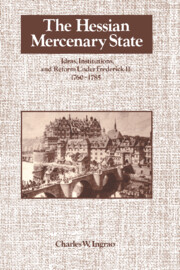Book contents
6 - Cassel's golden age
Published online by Cambridge University Press: 22 October 2009
Summary
Regardless of their overall opinion of Frederick, historians have hastened to point out that the money from the American venture helped pay for the great building boom that converted Cassel into one of Europe's most beautiful cities and its court into one of Germany's most brilliant. To his detractors it was a self-indulgent waste of the blood money he had received from the British. To his apologists it demonstrated Frederick's commitment to stimulating intellectual and cultural life, as well as Cassel's local economy. The fact is that Frederick had committed himself to rebuilding Cassel during his first decade as landgrave, long before his involvement in the American Revolution. In launching the building program, he was not merely spending excess cash either through senseless extravagance or as a patron of the arts but, rather, was simply succumbing to the inexorable pull of yet another consuming passion that was reinforced and rationalized by the conviction that he was doing it for the good of society.
Like so many of Frederick's policies the beautification of Cassel followed established patterns of princely or government behavior that could be easily justified by Enlightenment ideas. This does not impinge on the sincerity of his commitment to these ideas, but it does illustrate the ease with which initiatives could be launched when they already conformed and could be combined with existing praxis. Since the Renaissance the patronage of a brilliant and cultured court had been as much a part of a prince's world as was his military calling.
- Type
- Chapter
- Information
- The Hessian Mercenary StateIdeas, Institutions, and Reform under Frederick II, 1760–1785, pp. 164 - 187Publisher: Cambridge University PressPrint publication year: 1986



